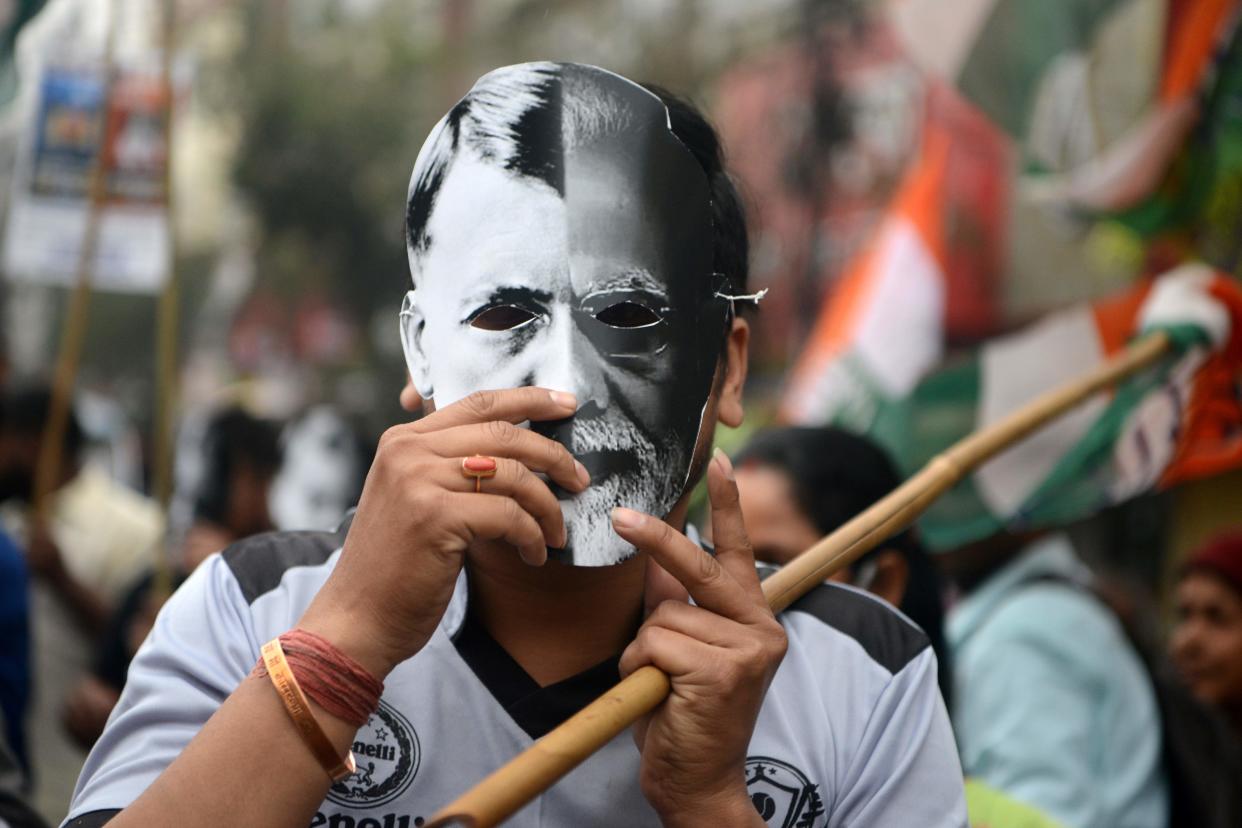India ‘no longer a democracy’, claims damning research report

File An Indian Youth Congress activist takes part in a protest on 26 February, 2021. A Sweden-based report said India an electoral autocracy
(AFP via Getty Images)A Swedish research institute has declared India an “electoral autocracy”, the second report within a week that has stripped the country of its “the world’s largest democracy” status.
The major decline occurred following Narendra Modi-led Bharatiya Janata Party (BJP) victory in 2014 elections and its Hindu-nationalist agenda, V-Dem Institute, an independent research institute based at the University of Gothenburg, said.
On 3 March, a Freedom House report downgraded India’s status to “partly free” citing decline of civil liberties under Mr Modi’s leadership.
The data-heavy report by V-Dem said India suffered a 23-percentage point drop on its 0-to-1 Liberal Democracy Index (LDI) scale, registering “one of the most dramatic shifts” across the countries in past 10 years.
The censorship of media has deteriorated to the level of Pakistan and worse than its neighbours Bangladesh and Nepal since 2013.
“India is, in this aspect (censorship) now as autocratic as is Pakistan, and worse than both its neighbours Bangladesh and Nepal,” the report named “Autocratization Turns Viral” said.
“In general, the Modi-led government in India has used laws on sedition, defamation, and counterterrorism to silence critics. For example, over 7,000 people have been charged with sedition after the BJP assumed power and most of the accused are critics of the ruling party,” the report noted.
India’s decline in status was the part of global shift, noting that the top ten decliners were several G20 nations, including Brazil, US, and Turkey.
It found that India is among the country that is leading the “third wave of autocratisation”.
The growing use of defamations law which is “frequently used to silence journalists” and the rampant use of Unlawful Activities Prevention Act (UAPA) by making amendments to it 2019 used to “harass, intimidate, and imprison political opponent” have gone against its Constitution’s commitment secularism.
The report made reference to crackdown on protesters of Citizenship Amendment Act, increasing use of Foreign Contributions Regulation Act (FCRA) to restrict the entry, exit and functioning of Civil Society Organisations and harassment of journalists covering Covid-19, among other issues.
“These developments are among the instances contributing to the descent into electoral authoritarianism in what used to be the world’s largest democracy,” it said.
The fifth annual report by the Swedish institute noted that democracies have been diminishing for over a decade from 41 countries to 32 countries.
In the list of top 10 autocratising countries, only Brazil, Mauritius, and Poland remain democracies while Hungary, Turkey, Brazil, Serbia, Benin, India and Bolivia were electoral autocracy.
The accelerating wave of autocratisation has engulfed 25 nations, contributing to one-third of the world’s population that is 2.6 billion people.
US-based think tank Freedom House last week said Mr Modi’s political party“tragically driving India towards authoritarianism”, declining India’s score from 71 to 67 since last year’s report on its “most free” ranking.
India reacted sharply to the report calling it “misleading, incorrect and misplaced”. It gave seven-point rebuttal to the report and said the country enjoys “a vibrant democracy, which gives space to those who hold varying views”.
Read More
India ‘no longer a free country’, says global watchdog report
Climate activist Disha Ravi, and India’s shrinking space for dissent
A case for contempt? Kunal Kamra, the stand-up comedian taking on India’s Supreme Court

 Yahoo News
Yahoo News 
